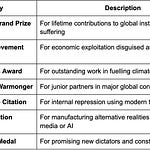Okay, Trump has got his genres mixed, yet again. This time attacking the Democratic Mayoral candidate for New York City. His words “I will withhold funding for New York City if presumptive Democratic mayoral nominee Zohran Mamdani becomes mayor after November’s general election and doesn’t do the “right thing.”
Mamdani, a self-described democratic socialist, was Trumpified as a “pure communist.”
“I think he admits it ... If he does get in, I'm gonna be president and he's gonna have to do the right thing or they're not getting any money. He's gotta do the right thing.” Trump claimed that Mamdani would be “very bad for New York.”
“I used to say, we will never have a socialist in this country, no, but we'll have a communist. I mean, he's a communist and going to be mayor of New York”.
Somewhat of a shame that the USA does not have a President capable of rational thought or debate.
At the risk of dumbing things down, especially for you Donald are some key definitions and distinctions.
Democrat
A "Democrat" generally refers to a supporter of a democratic system of government, where power is vested in the people and exercised by them directly or through freely elected representatives. In the UK, this term isn't tied to a single party in the same way it is in the US. However, parties that champion democratic principles and often lean towards social justice are common. There’s a key point - SOCIAL JUSTICE.
General Democratic Principles:
Representative Government: Belief in a system where citizens elect representatives to make decisions on their behalf.
Rule of Law: Adherence to a legal framework that applies equally to all, ensuring justice and order.
Individual Liberties: Protection of fundamental rights and freedoms for all citizens, such as freedom of speech, assembly and religion.
Free and Fair Elections: Commitment to regular, open and competitive elections.
Accountability: Government and public officials are held responsible for their actions.
Key Distinction: While all the ideologies discussed here operate within or aspire to a form of governance, "Democrat" specifically emphasises the method of governance, through the will of the people, rather than a particular economic system.
Socialist
Socialism is a broad political and economic theory that advocates for social ownership or democratic control of the means of production, distribution and exchange, rather than private ownership. It encompasses a wide range of ideologies and approaches.
General Socialist Principles:
Social Ownership: The primary focus is on ensuring that the means of producing goods and services (factories, land, resources etc.) are owned or controlled by the community as a whole, rather than private individuals or corporations. This can take various forms such as state ownership, worker cooperatives or public corporations.
Emphasis on Equality and Collective Well-being: Socialists prioritise reducing economic inequality and ensuring that everyone has access to basic necessities and opportunities.
Strong Social Safety Net: They generally advocate for robust welfare programmes, universal healthcare, free education and other social services to guarantee a baseline quality of life for all citizens.
Democratic or Participatory Control: Many forms of socialism emphasise democratic decision-making in both politics and the workplace.
Varieties of Socialism (and why it's not Communism):
Democratic Socialism: This is a key distinction from communism. Democratic socialists aim to achieve socialist goals through democratic means, such as elections and reforms, within a multi-party system. They believe in maintaining democratic freedoms, including free speech assembly and the right to dissent. Many democratic socialists envision a mixed economy where some industries are socialised, while others remain private, but with strong regulation and worker protections. Scandinavian countries are often cited as examples of nations with strong social democratic policies, though they are still fundamentally capitalist.
Social Democracy: Often considered a more moderate form of socialism, social democrats aim to humanise capitalism through strong welfare states, significant government regulation and social programmes, while largely retaining private ownership of industry. Their goal is to reduce inequality and provide a safety net within a capitalist system, rather than abolish capitalism entirely.
Evolutionary/Reformist Socialism: This approach emphasises gradual, incremental changes to transition society towards socialist ideals through existing political structures, rather than revolution.
Crucial Point: Socialism, particularly democratic socialism, fundamentally embraces democratic governance, individual rights and often a mixed economy. It seeks to reform or transition away from pure capitalism through peaceful and democratic means.
Communist
Communism, particularly as theorised by Marx and Engels, is a revolutionary socioeconomic ideology that ultimately aims for a classless, stateless society in which the means of production are communally owned, and there is no private property.
Core Tenets:
Abolition of Private Property: A central tenet is the communal ownership of all means of production and, ultimately, all property. "From each according to his ability, to each according to his needs" is a guiding principle for distribution.
Class Struggle and Revolution: Communism posits that history is a series of class struggles, and that the only way to achieve a truly egalitarian society is through a revolutionary overthrow of the capitalist system by the working class (proletariat).
Stateless, Classless Society (Ultimate Goal): In its pure theoretical form, communism envisions a society where the state "withered away" after the revolution, and class distinctions cease to exist.
Central Planning: Historically, communist states have implemented highly centralised, command economies where the government controls all aspects of production and distribution.
Dictatorship of the Proletariat (Transitional Phase): Marxists often speak of a transitional phase after the revolution, where the working class exercises political power to dismantle the old capitalist structures. In practice, this has often led to authoritarian, one-party states.
Why the USSR, China and North Korea Were Not Truly "Communist":
It is important to clarify that the political and economic systems of the Soviet Union, China (especially after Deng Xiaoping's reforms) and North Korea, while often labelled "communist," did not achieve the ultimate theoretical goals of communism as envisioned by Marx.
Lack of a Stateless Society: Marx's vision of communism was a stateless society. The USSR, China and North Korea, however, developed into highly centralised, authoritarian states with immense power and control over their populations. The state never "withered away" but instead became a dominant, often oppressive, force.
Lack of a Classless Society: While these regimes aimed to abolish private ownership of the means of production, they often created new forms of hierarchy and privilege within the party structure or state bureaucracy, effectively forming new "classes" with differential access to resources and power.
State Capitalism/Totalitarianism: Many argue that these systems were more accurately described as forms of "state capitalism" or "totalitarianism." In these systems, the state itself became the primary capitalist, controlling all major industries and resources, rather than the means of production being truly communally owned by a free association of producers. The citizens had little to no democratic control over these state-owned enterprises or the government itself.
Suppression of Individual Freedoms: Crucially, these regimes systematically suppressed individual liberties, free speech and political dissent, which runs contrary to the spirit of liberation often associated with the ultimate goals of communism (even if the path to get there was revolutionary).
Therefore, while these nations were governed by parties that claimed adherence to Marxist-Leninist ideology and used the term "communist" to describe themselves, their practical implementation deviated significantly from the theoretical ideals of a stateless, classless and free communist society. They were, in essence, highly centralised, authoritarian states that implemented command economies, often with devastating consequences for their populations.
Why Being a Socialist Does NOT Mean You Are a Communist:
The most critical distinction lies in the means of achieving goals and the role of democracy and individual liberty.
Revolution vs. Reform: Communists believe that a violent revolution is necessary to overthrow capitalism. Socialists, particularly democratic socialists, advocate for achieving their goals through peaceful, democratic and electoral processes.
Authoritarianism vs. Democracy: Communism, in its practical application (as seen in the USSR, China, North Korea), has almost invariably led to authoritarian, single-party states that suppress individual freedoms and political opposition. Socialism, especially democratic socialism, is fundamentally committed to maintaining and strengthening democratic institutions, protecting civil liberties and allowing for multi-party political systems.
Total Abolition vs. Mixed Economy/Reform: Communism aims for the complete abolition of private property and a stateless society. Many forms of socialism, particularly in modern democratic countries, seek a mixed economy where the state plays a significant role in providing social services and regulating the economy, but private enterprise and ownership still exist.
While socialism and communism share roots in critiquing capitalism and seeking greater equality, their pathways, methods and ultimate visions for society diverge dramatically, particularly concerning the role of democracy and individual freedom. Being a socialist, especially a democratic socialist, means advocating for social and economic justice through democratic means, which is a stark contrast to the revolutionary and often authoritarian nature of communism, and certainly distinct from the totalitarian regimes that historically claimed the communist label.
Socialism fundamentally strives for social justice and fairness, aiming to create a society where collective well-being takes precedence and resources are distributed equitably. Far from seeking to maintain a class of poor or underserved citizens under capitalist approaches, socialist principles advocate for robust social safety nets, universal access to essential services like healthcare and education and policies designed to reduce economic inequality. The core idea is that society should collectively ensure that everyone's basic needs are met and that opportunities are available to all, thereby eradicating the very conditions that lead to poverty and marginalisation.
Author Michael Jones













Share this post